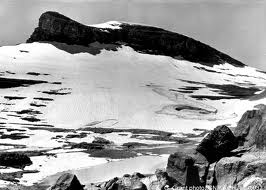
U.S.G.S. Photo of peaks losing snow
While writers tell the exuberant story of skiers and snowboarders on the mountains a few days from summer in the Rockies, not all that unusual at such high altitudes, the question is whether this is a good thing for the ski business or a sign of climate change that will disrupt economies.
First it needs to be put in perspective. Federal researchers this week reported in Science that the overall snowpack has suffered its biggest decline in 800 years. It ranges from 30 percent to 60 percent in the past 50 years. The decline is unprecedented.
This raises the question of global warming and climate change. The latter is a particularly serious problem for states like Colorado and Utah, which depend on the snow to fall and melt, and the rain to come down, at the times their businesses have been designed to use the precipitation.
So much snow fell this season in the Colorado Rockies that reservoirs built to hold drinking water can't handle it and have had to release some. It also makes flooding likely when the snow does melt. Cooler weather in the past few days has helped but the heat will come and the snow will melt and creeks and rivers will rage.
No industry is better prepared for the prevarications of weather than skiing. They buy water rights and store it. They make it if it comes late. They can delay the opening of their seasons and stay open longer, up to a certain point.
But ski visits lost in the winter holidays or spring are not going to be made up in June. Most workers have left, making it possible only to have limited terrain open.
More important, many people have lost their taste for skiing and are out golfing.
In any case, the future is likely to be drier even in the higher country.
"It doesn't take a rocket scientist to know that if temperatures get warmer, snow and ice melt sooner," Greg Pederson of othe U.S. Geological Survey's Northern Rocky Mountain Science Center in Bozeman, Mont., told Sci-Tech Today.
This level of snowpack decline has not occurred before, researchers are now able to say, scientist Philip Mote of Oregon State University said.